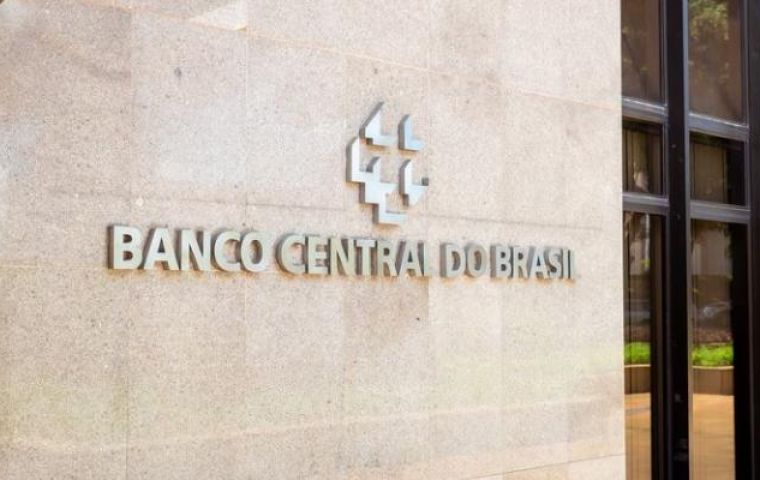MercoPress. South Atlantic News Agency
Brazilian central bank raises Selic rate to 10,75%, fearing inflation resurgence
 ”The pace of future adjustments of the interest rate and the total magnitude of the cycle that just started will be determined by the firm commitment of reaching the” target, said the release
”The pace of future adjustments of the interest rate and the total magnitude of the cycle that just started will be determined by the firm commitment of reaching the” target, said the release While the United States Federal Reserve decided to cut its reference interest rate arguing inflation was under control, Brazil's Central Bank decided the opposite and actually hiked 25 bases point its already high Selic benchmark from 10,50% to 10,75%.
The bank's monetary policy committee, Copom, in a unanimous decision agreed on the increase, fearing a resurgence of inflation given a faster than expected growth performance of the Brazilian economy. Furthermore it left the door open for more increases if necessary.
“The pace of future adjustments of the interest rate and the total magnitude of the cycle that just started will be determined by the firm commitment of reaching the inflation target and will depend on the inflation dynamics,” Copom wrote in its policy statement.
“The scenario, marked by resilient economic activity, labor market pressures, positive output gap, an increase in the inflation projections, and unanchored expectations, requires a more contractionary monetary policy,” they wrote.
Inflation expectations for 2024 and 2025 collected by the Focus survey are around 4.4% and 4.0%, respectively. Copom's inflation projections for the first quarter of 2026, current relevant horizon for monetary policy, stand at 3.5% in the reference scenario
“The Committee stresses that a credible fiscal policy, committed to debt sustainability, contributes to the anchoring of inflation expectations and to the reduction in the risk premia of financial assets, therefore impacting monetary policy.”
Brazil's 12-month inflation reached 4.24% in August. The central bank raised its baseline inflation forecasts to 4.3% for this year and 3.7% for 2025, up from 4.2% and 3.6% previously.
For the first quarter of 2026, considered the relevant horizon for monetary policy, the projection was 3.5%, up from the previous 3.4%. In all three cases, estimates are above the 3% target, which has a tolerance margin of 1.5 percentage points on either side.
Expectations on tighter policy had been building since late July, when central bank minutes indicated that policymakers would not hesitate to raise borrowing costs if needed amid growing upside risks for inflation.
Since then, the central bank's communication has turned more hawkish, including messaging from monetary policy director Gabriel Galipolo, who was confirmed as president Lula da Silva's appointee to lead the central bank after Campos Neto's term expires in December.




Top Comments
Disclaimer & comment rulesNo comments for this story
Please log in or register (it’s free!) to comment. Login with Facebook